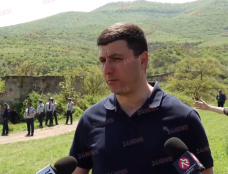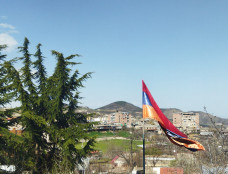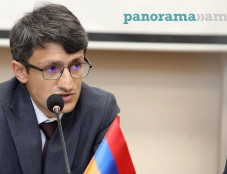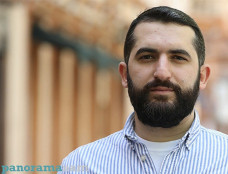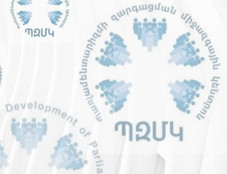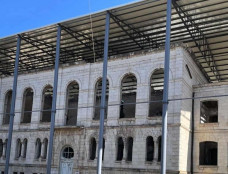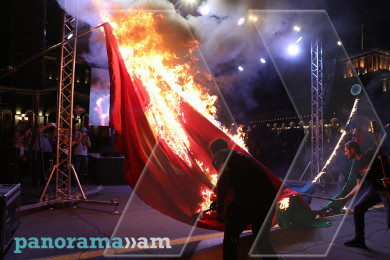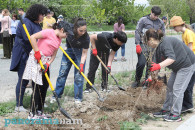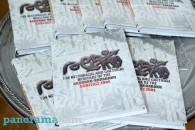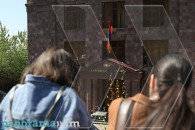
Scholars call for reexamination of ECHR judgment on Genocide denial case
Concerned genocide scholars issued an open letter highlighting ”historical and conceptual inaccuracies” in the European Court’s decision on Dogu Perinçek v. Switzerland, and called on the government of Switzerland to request a reexamination of the Court’s judgment, The Armenian Weekly reports.
Below is the full text of the letter, released on Feb. 14.
An Open Letter to:
Madame la Conseillère fédérale
Simonetta Sommaruga
Cheffe du Département fédéral de justice et police (DFJP)
Palais fédéral ouest
CH-3003 Berne
After having read the European Court’s decision on Dogu Perinçek v. Switzerland (ECHR. 370, 230, 17 December, 2013) we, as concerned genocide scholars, believe it imperative to respond to historical and conceptual inaccuracies that are articulated in the decision, and we believe those inaccuracies have serious ethical and social significance.
We do not take issue with the notion of freedom of expression, something that scholars agree is most often an essential part of open, democratic society. We are, however, concerned about elements of the Court’s reasoning that are at odds with the facts about the historical record on the Armenian genocide of 1915 and at odds with an ethical understanding of denialism.
The decision asserts that: 1) “genocide as a precisely defined legal concept was not easy to prove”; 2) “the Court doubted that there could be a general consensus as to the events such as those at issue, given that the historical research was by definition open to discussion and a matter of debate, without necessarily giving rise to a final conclusion or to the assertion of objective and absolute truths”; the court uses the phrase “heated debate” in referring to the current political context surrounding the Armenian genocide.
First, it is the overwhelming conclusion of scholars who study genocide (hundreds of independent scholars, who have no affiliations with governments, and whose work spans many countries and nationalities and the course of decades) that the Ottoman mass killings of Armenians conforms to all the aspects of Article 2 of the U.N. CPPC definition of genocide.
In 1997, the International Association of Genocide Scholars (IAGS), the major body of scholars who study genocide, passed a resolution unanimously recognizing the Ottoman massacres of Armenians as genocide. The International Center for Transitional Justice (ICTJ) prepared an analysis for the Turkish Armenian Reconciliation Commission (TARC) in 2003, stating that “the Events [of 1915] include all of the elements of the crime of genocide as defined in the Convention (UNCPPCG).
In 2000, 100 leading Holocaust scholars signed a petition in The New York Times affirming the events of 1915 were genocide and urging worldwide recognition. An Open Letter from the IAGS to Turkish Prime Minister Erdogan, in June, 2005, enjoined the Turkish government to own up to “the unambiguous historical record on the Armenian genocide.” The only three histories of genocide in the 20th century that genocide-studies theorists (such as William Schabas) agree on are the cases of the Armenians in Turkey, in 1915; the Jews in Europe, in 1940–45; and the Tutsis in Rwanda, in 1994. The destruction of the Armenians was central to Raphael Lemkin’s creation of the concept of genocide as a crime in international law, and it was Lemkin who coined and first used the term Armenian Genocide in 1944.
The idea put forth by the Court that crimes of genocide may only apply to the events in Rwanda and at Srebrenica because they were tried at the ICC is incomplete. Crimes of genocide have been assessed as historical events by scholars for decades now, and both the crimes committed against the Armenians by the Ottoman Turks in 1915 and those committed against the Jews of Europe by the Nazis in the 1940s were deemed genocide by Lemkin. As legal scholars have noted, crimes of genocide can be tried retroactively, and William Schabas has pointed out that in the Eichmann trial in Jerusalem, in 1961, the word genocide was used retroactively to designate crimes committed against the Jews.
Further, under Article 10, “the Court clearly distinguished the present case from those concerning the negation of the crimes of the Holocaust. . . . because the acts that they had called into question had been found by an international court to be clearly established.” We would note that the perpetrators of the Holocaust were prosecuted at the Nuremberg Trials (1945–46), not for the crime of genocide, but for “crimes against humanity,” even though Raphael Lemkin had previously created the term “genocide.” The Armenian case, contrary to the Court’s assertion, does have a clear legal basis for its authenticity. First, “crimes against humanity” was the very phrase coined by France, the United Kingdom, and Russia in their 1915 joint declaration in response to the massacres of the Armenians by the Ottoman Turkish government. After WWI, the Ottoman government convened military tribunals (1919–20) to try 200 high-level members of the military and government for premeditated mass murder of the Armenian population. The ICTJ decision of 2006 also affirms such a legal basis.
The Court also decided, on the basis of Article 17 (prohibition of abuse of rights), that “The rejection of the legal characterization as ‘genocide’ of the 1915 events was not such as to incite hatred against the Armenian people.” Yet the ECtHR states (para 19) that “the negation of the Holocaust is today the principal motor of anti-Semitism.” We would note similarly that the denialism of the Armenian genocide in Turkey resulted in the assassination of Armenian Turkish journalist Hrant Dink, and has resulted in violence to others in Turkey.
In referring to the Armenian genocide as “an international lie,” Mr. Perençik reveals a level of extremism that belies all sense of judgment. We believe that the Court makes a misstep when it privileges Turkey’s denialism (a country with one of the worst records on intellectual freedom and human rights over the past decades) as a “heated debate.” As the IAGS has written in an Open Letter on denialism and the Armenian genocide (October, 2006), “scholars who deny the facts of genocide in the face of the overwhelming scholarly evidence are not engaging in historical debate, but have another agenda. In the case of the Armenian Genocide, the agenda is to absolve Turkey of responsibility for the planned extermination of the Armenians—an agenda consistent with every Turkish ruling party since the time of the Genocide in 1915. Scholars who dispute that what happened to the Armenians in the Ottoman Empire in 1915 constitutes genocide blatantly ignore the overwhelming historical and scholarly evidence.”
As noted genocide scholar Deborah Lipstadt has written: “Denial of genocide whether that of the Turks against the Armenians, or the Nazis against the Jews is not an act of historical reinterpretation . . . . The deniers aim at convincing innocent third parties that there is another side of the story . . . when there is no other side.” We believe that the Court’s decision and reasoning contributes to denialism and this has a corrosive impact on efforts for truth and reconciliation, and ethics.
We believe it important that the government of Switzerland request a reexamination of the Court’s judgment in this case.
Sincerely,
Taner Akçam, Kaloosdian/Mugar Professor, Center for Holocaust and Genocide Studies, Clark University
Margaret Lavinia Anderson; Professor of the Graduate School (Current); Professor of History emerita; University of California – Berkley
Joyce Apsel, Master Teacher of Humanities, New York University; Past President, International Association of Genocide Scholars
Yair Auron, head, Department of Sociology, Political Science and Communication, The Open University of Israel
Peter Balakian, Donald M. and Constance H. Rebar Professor of the Humanities, Colgate University
Annette Becker, Professor of History, University of Paris, Ouest Nanterre La Defense; senior member, Institut Universitaire de France
Matthias Bjornlund, archival historian; Danish Institute for Study Abroad (DIS), Copenhagen
Donald Bloxham, Professor of Modern History, University of Edinburgh
Hamit Bozarslan, Director, EHESS, Paris
Cathy Caruth, Frank H. T. Rhodes Professor of Humane Letters, Cornell University
Frank Chalk, Professor of History; Director, Montreal Institute for Genocide and Human Rights Studies
Israel Charny, Past President International Association of Genocide Scholars; Director, Institute on the Holocaust and Genocide, Jerusalem
Deborah Dwork, Rose Professor of History; Director of the Strassler Center for Holocaust and Genocide Studies, Clark University
Helen Fein, Independent Scholar; former executive director of Institute for the Study of Genocide (New York)
Marcelo Flores, Professor of Comparative History; director, The European Master in Human Rights and Genocide Studies, University of Siena
Donna-Lee Frieze, Prins Senior Fellow, Center For Jewish History, New York City; Visiting Fellow, Alfred Deakin Research Institute, Deakin University, Melbourne.
Wolfgang Gust, Independent Scholar, Director armenocide.com.de Hamburg
Herbert Hirsch, Professor of Political Science, Virginia Commonwealth University; co-editor, Genocide Studies International
Marianne Hirsch, William Peterfield Trent Professor of English and Comparative Literature at Professor in the Institute for Research on Women, Gender, and Sexuality; Columbia University
Tessa Hofmann, Prof. h.c. Dr. phil, Frie Universitat Berlin, Institute for East European Studies
Richard Hovanissian, Professor Emeritus, Armenian and Near Eastern History at the University of California, Los Angeles; Distinguished Visiting Scholar at Chapman University and the University of California, Irvine
Raymond Kevorkian, Historian, University of Paris-VIII-Saint Denis
Hans-Lukas Kieser, Professor of Modern History, University of Zurich
Mark Levene, Reader in Comparative History, University of Southampton, UK
Robert Jay Lifton, MD; Distinguished Professor Emeritus, The City University of New York
Deborah Lipstadt, Dorot Professor of Modern Jewish History and Holocaust Studies, Emory University
Wendy Lower, John K. Roth Professor of History, Claremont McKenna College
Robert Melson, Professor Emeritus, Purdue University; Past President, International Association of Genocide Scholars
Donald E. Miller, Professor of Religion; Director, Center for Religion and Civic Culture, University of Southern California
A. Dirk Moses, Professor of Global and Colonial History, European University Institute, Florence and Senior Editor, Journal of Genocide Research.
James R. Russell, Mashtots Professor of Armenian Studies, Harvard University
Roger W. Smith, Professor Emeritus of Government, College of William and Mary; Past President, International Association of Genocide Scholars
Leo Spitzer, K.T. Vernon Professor of History Emeritus, Dartmouth College
Gregory Stanton, Research Professor in Genocide Studies and Prevention, George Mason University; Past President, International Association of Genocide Scholars
Yves Ternon, Historian of modern genocide, independent scholar, France
Henry C. Theriault, Professor of Philosophy, Worcester State University; Co-Editor-in-Chief, Genocide Studies and Prevention
Eric D. Weitz, Dean of Humanities and Arts and Professor of History, The City College of New York/Graduate Center
Newsfeed
Videos






